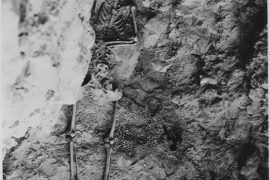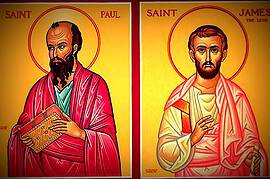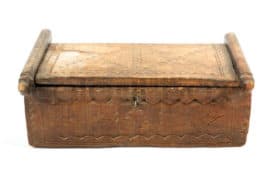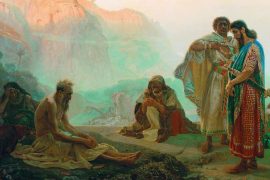Today is the biblical Shavuot as observed in late 2nd Temple times–not on a date of the Jewish month (Sivan 5th), which never changes, but a literal counting of days from the Sunday (“morrow after the Sabbath”), seven Sabbath will be complete untiil the “morrow” (Sunday) after the 7th Sabbath. It seems to correspond to the the Israelites in the days of Moses arriving at Mt Horeb and the giving of the Ten Words (aka “Commandments”). The symbolism that Luke reflects in Acts 2 was not lost on those Christians who then saw that day, from the year 30 CE, as the “Giving” of a New Covenant–that Paul began to say had superseded the one at Horeb–which was then called the “Old” Covenant–leading to the use of the term The Old Testament, for all the books of the Jewish Bible.
Of course how to count the 50 days different in antiquity among different Jewish groups, as it does today. You can read the somewhat ambiguous instructions in Leviticus 23:15-16, It was later referred to as the “festival of weeks,” or in Greek “Pentecost,” which means “count 50.” That name has stuck with Christians, based Acts 2. The Dead Sea Scroll group had their own calculations, beginning with the Sabbath AFTER the seven days of Unleavened Bread. Despite the Horeb tradition, it appears to be basically a summer early Harvest celebration…which culminated in the Fall Harvest of the festival of “booths” or “huts” (Tabernacles). You can read what little we know about it in these three annual pilgrim/harvest texts:
Ex. 34:22 And you shall observe the feast of weeks, the first fruits of wheat harvest, and the feast of ingathering at the year’s end.
Num. 28:26 “On the day of the first fruits, when you offer a cereal offering of new grain to the LORD at your feast of weeks, you shall have a holy convocation; you shall do no laborious work,
Deut. 16:10 Then you shall keep the feast of weeks to the LORD your God with the tribute of a freewill offering from your hand, which you shall give as the LORD your God blesses you; 11 and you shall rejoice before the LORD your God, you and your son and your daughter, your manservant and your maidservant, the Levite who is within your towns, the sojourner, the fatherless, and the widow who are among you, at the place which the LORD your God will choose, to make his name dwell there. 12 You shall remember that you were a slave in Egypt; and you shall be careful to observe these statutes.
Deut. 16:16 “Three times a year all your males shall appear before the LORD your God at the place which he will choose: at the feast of unleavened bread, at the feast of weeks, and at the feast of booths. They shall not appear before the LORD empty-handed;
2Chr. 8:13 as the duty of each day required, offering according to the commandment of Moses for the sabbaths, the new moons, and the three annual feasts — the feast of unleavened bread, the feast of weeks, and the feast of tabernacles.









Comments are closed.